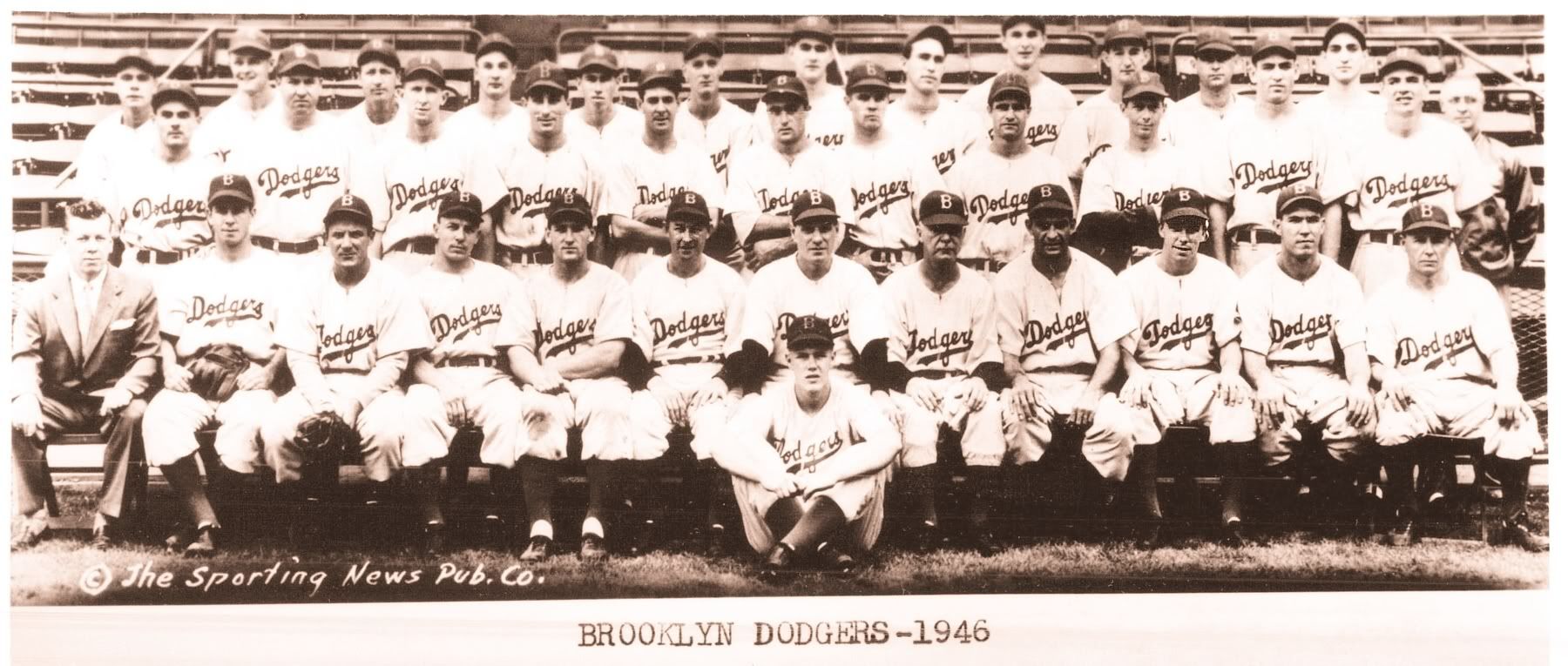 |
| Brooklyn's last non-integrated team went 96-60 (Baseball Fever) |
'Dem Bums emerged as a powerhouse immediately before the war, eclipsing 100 wins in the 1941 and 1942 seasons before star players departed to join the war effort. Brooklyn remained competitive during the war years, albeit not nearly as dominant as they'd been beforehand. The Dodgers fielded winning records in 1943 and 1945, finishing 20 games over .500 in '45.
The 1946 edition, Brooklyn's last all-white team, was unlike the hitting-heavy clubs that proceeded it in that it was buoyed by outstanding pitching. The Bums compiled a 3.05 ERA, which was good for second best in the majors, while pacing the National League in strikeouts, saves, and fewest hits allowed. The rotation was led by the trio of rookie Joe Hatten, All-Star Kirby Higbe, and sophomore Vic Lombardi, all of whom were versatile enough to make at least 25 starts and 10 relief appearances each. In all, six of the seven hurlers who started 10 games or more posted an above average adjusted ERA, with starters combining for a 3.04 ERA. The bullpen, led by reliable fireman Hugh Casey, was nearly as effective, leading the league in saves and compiling a 3.07 ERA.
Brooklyn's lineup was less impressive, with 35 year-old All-Star Dixie Walker being the only regular to bat over .285, knock in more than 75 runs, and top an .800 OPS. Only two players reached double digit homers, with Pete Reiser's 11 leading the team, and nobody registered 30 doubles. Even with their astounding lack of power, the Dodgers still finished second in the NL in runs scored and OPS, largely because they led the loop in OBP, walks, steals, and triples. Brooklyn's punchless lineup expertly manufactured runs like a finely tuned machine, much like last year's Royals.
After falling 5-3 to the Braves, then of Boston, on Opening Day, Leo Durocher's Dodgers ripped off eight straight wins to vault into first place. They remained there for much of the summer, spending just one day out of first between May 22nd and August 25th. Brooklyn fell behind the hard-charging St. Louis Cardinals at the end of August and played catch-up for most of September despite going 21-8 that month. The Dodgers finally tied the Cardinals for first on September 28th--the regular season's penultimate day--but incredibly both teams lost home games the next day against clearly inferior teams to finish the season at 96-58, forcing the first-ever pennant tiebreaker.
Brooklyn won the coin-toss to determine home field advantage for the best-of-three series and opted to play the first game in St. Louis, which meant games two and three would be played at Ebbets Field. The Dodgers clearly did not think this through, as that entailed traveling from New York to St. Louis by train, then immediately turning around and heading back to New York. The Cardinals, who were already in St, Louis, did not need to go anywhere for the first game and were thus well-rested when the weary Dodgers arrived.
Not surprisingly, the Cardinals took game one 4-2 behind a complete game from Howie Pollet. Meanwhile, visiting starter Ralph Branca--a name that would become infamous five years later--failed to make it out of the third inning. The Dodgers doubled their scoring output in the second game, but so did the Cardinals and that was that. St. Louis headed back to the World Series, their fourth in five seasons, where they would upset the Boston Red Sox in seven games. The Dodgers went home empty-handed, left to wonder how they would have fared against Ted Williams and co. Who knows how the series would have played out had it begun in Brooklyn, forcing St. Louis to make the nearly 1,000 mile journey before Game 1.
One also has to wonder how Brooklyn would have fared with Jackie Robinson, Don Newcombe, and Roy Campanella--all cutting their teeth in its farm system that year--on the major league roster. Newcombe, who turned 20 that summer and didn't debut until 1949, probably wouldn't have made the team, but Campanella (24) and Robinson (27) likely would have been starters, especially since the Dodgers relied on a rookie catcher, 22 year-old Bruce Edwards, and 21 year-old first baseman Ed Stevens, neither of whom could hold a candle to the Hall of Fame talents of their eventual successors. Given their more advanced age and how well they played upon arriving in the big leagues, it seems safe to say that Campy and Jackie would have helped Brooklyn win at least one more regular season game and thus avoid the playoff series altogether.
It's just a shame they didn't get the chance.
Great analysis. My dad was a copy boy for the New York Daily News and was in the train ride to St Louis. Such was the hurry that the return train left immediately after the game. He flew back after returning a generator rented for the transmission equipment.
ReplyDelete